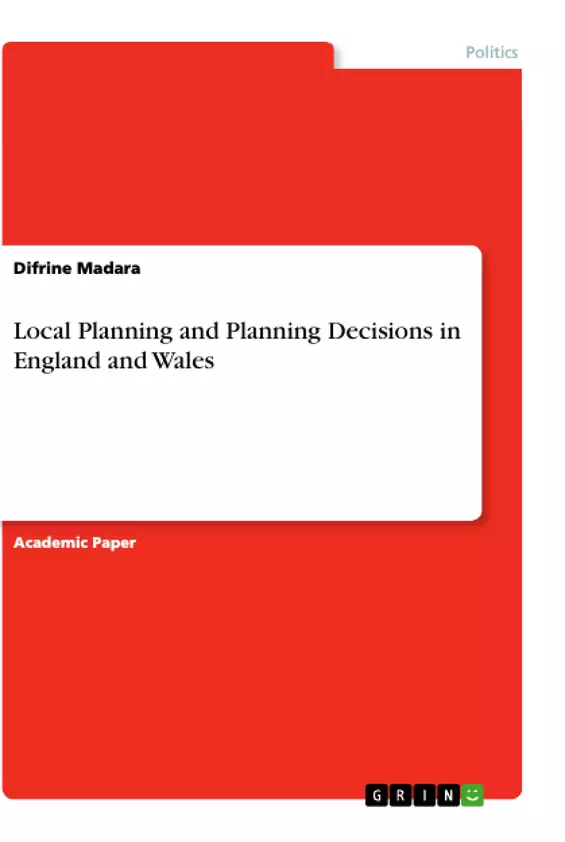Planning is one of the most important steps in the development of effective policies to assist in addressing various social, political, and economic issues in the society. Basically, planning refers to the process of identifying the activities necessary to attain the desiredgoal (Malpass, 2003). In other words, planning is a description of the processes, which will be needed to achieve the desired results. For instance, planning encompasses the creation and maintenance of a plan. In this regard, planning takes place at the initial stages of policy development and consist of the preparation of action steps to achieve particular goals. In the field of public policy, every country, state or local authorities have specific procedures of developing plans and making planning decisions (Cole and Goodchild, 2000). In this paper, the reviewer explores how planning decisions are made in England and Wales and the benefits of the local planning policy in planning decisions.
Inhaltsverzeichnis (Table of Contents)
- Introduction
- Historical Background
- Planning Decisions
- Planning Policy
- Planning Appeal Processes and Possible Outcomes
Zielsetzung und Themenschwerpunkte (Objectives and Key Themes)
This paper investigates the planning system in England and Wales, exploring how planning decisions are made and highlighting the benefits of local planning policies in shaping these decisions. The focus is on understanding the historical development of the system, the key elements of planning decisions, and the impact of local planning policies on development across the country.
- The evolution of the planning system in England and Wales, tracing its roots back to the post-war era.
- The role of planning permissions in regulating land development and shaping urban landscapes.
- The process of planning decisions, including the role of local planning authorities and the involvement of stakeholders.
- The impact of local planning policies on the environment, economy, and social well-being of communities.
- The significance of public engagement and consultation in planning decisions.
Zusammenfassung der Kapitel (Chapter Summaries)
- Introduction: This chapter introduces the concept of planning, highlighting its importance in addressing social, political, and economic issues within a society. The chapter also outlines the paper's objective, which is to examine the process of planning decisions in England and Wales and the benefits of local planning policies.
- Historical Background: This chapter traces the historical development of the UK's planning system, highlighting its roots in the post-war period and the concerns about rapid industrialization and urbanisation. It also explores the key legislation and reports that have shaped the modern planning system in England and Wales.
- Planning Decisions: This chapter delves into the process of planning decisions, examining the role of local planning authorities, the need for planning permissions, and the importance of public engagement. The chapter also discusses how delegated authorities and consultation processes ensure that diverse viewpoints are considered in planning decisions.
Schlüsselwörter (Keywords)
Local planning, planning decisions, England and Wales, historical background, planning permissions, local planning authorities, planning policies, public engagement, consultation processes, development control, urban planning, post-war era, Town and Country Planning Act, urban sprawl, environmental protection, economic growth, community well-being.
Frequently Asked Questions
How is planning defined in the context of public policy?
Planning refers to identifying the activities necessary to attain a desired goal and encompasses the creation and maintenance of action steps to achieve results.
What are the historical roots of the planning system in England and Wales?
The modern system has its roots in the post-war era, specifically shaped by the Town and Country Planning Act to address rapid industrialization and urban sprawl.
Who is responsible for making planning decisions?
Planning decisions are primarily made by Local Planning Authorities (LPAs), which regulate land development through planning permissions.
What is the importance of public engagement in the planning process?
Public engagement and consultation ensure that diverse viewpoints are considered, helping to balance economic growth with environmental protection and community well-being.
What happens if a planning application is rejected?
The system provides for a planning appeal process, where decisions can be reviewed by higher authorities to ensure fairness and adherence to policy.
- Quote paper
- Difrine Madara (Author), 2019, Local Planning and Planning Decisions in England and Wales, Munich, GRIN Verlag, https://www.grin.com/document/512919



